As vegetable and cereal growers brace themselves for a summer of potentially devastating drought, there is good news for British fruit growers, who have confounded predictions that frosts earlier this year would devastate Britain's orchard fruit crop.
A freak cold spell at the beginning of May had sparked fears the UK could face a shortfall in homegrown fruit such as plums, apples and apricots.
But although there were individual cases of growers losing entire crops, the overall impact had been less dramatic than feared, said Hayley Campbell-Gibbons, NFU chief horticulture adviser.
"They were regionally focused incidents, but it won't be the sort of thing that would affect national supply," she said.
Adrian Barlow, CEO of English Apples and Pears, which also compiles data on British stone fruit, said the English dessert apple crop had fared well despite some pockets of severe damage. "At this stage, it looks as though we're going to see a slight increase on last year's crop," he said.
Plums and cherries had suffered some damage from the frost but it "doesn't appear to be too great", he added.
The Co-operative Farms, the farming arm of The Co-operative Group, said it had experienced some frost damage, but less than 5% of its apple crop and between 10% to 15% of its plum crop had been affected. Apricots had seen more damage with up to 30% of this year's crop lost, but David Gardner, head of fruit growing operations, said he was not unduly concerned.
"The frosts on our farms have been patchy but far from severe, causing minimal damage to our crops overall," he said. Cherries and pears had not been affected at all, he added.
The UK is 34% self-sufficient in apples, 17% in pears and 16% in plums [Defra]. If large parts of the British orchard fruit crop had been hit, there would have been a shortage on shelves and retail prices would probably have risen sharply, with increased volumes of imports coming in to make up the shortfall.
A freak cold spell at the beginning of May had sparked fears the UK could face a shortfall in homegrown fruit such as plums, apples and apricots.
But although there were individual cases of growers losing entire crops, the overall impact had been less dramatic than feared, said Hayley Campbell-Gibbons, NFU chief horticulture adviser.
"They were regionally focused incidents, but it won't be the sort of thing that would affect national supply," she said.
Adrian Barlow, CEO of English Apples and Pears, which also compiles data on British stone fruit, said the English dessert apple crop had fared well despite some pockets of severe damage. "At this stage, it looks as though we're going to see a slight increase on last year's crop," he said.
Plums and cherries had suffered some damage from the frost but it "doesn't appear to be too great", he added.
The Co-operative Farms, the farming arm of The Co-operative Group, said it had experienced some frost damage, but less than 5% of its apple crop and between 10% to 15% of its plum crop had been affected. Apricots had seen more damage with up to 30% of this year's crop lost, but David Gardner, head of fruit growing operations, said he was not unduly concerned.
"The frosts on our farms have been patchy but far from severe, causing minimal damage to our crops overall," he said. Cherries and pears had not been affected at all, he added.
The UK is 34% self-sufficient in apples, 17% in pears and 16% in plums [Defra]. If large parts of the British orchard fruit crop had been hit, there would have been a shortage on shelves and retail prices would probably have risen sharply, with increased volumes of imports coming in to make up the shortfall.



















No comments yet